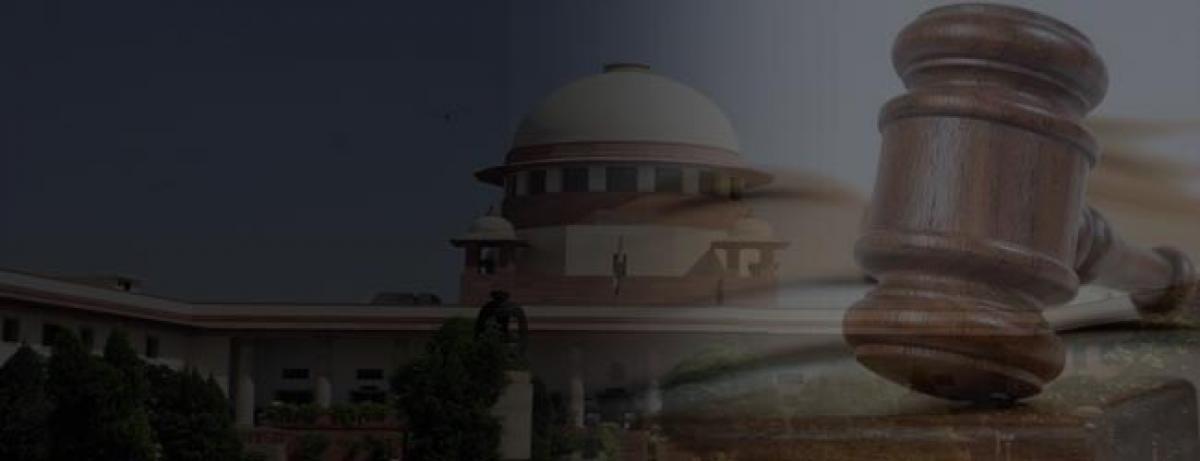Live
- Workshop conducted on Mathematics
- Revanth visits SLBC tunnel collapse site
- BJP has no discipline within party
- Hyd Muslims erupt in joy to welcome month of Ramzan
- Blue Ghost Touches Down! US firm Firefly makes its first moon landing
- MIMS hosts seminar on new developments in anesthesia
- Shankaracharya sees spiritual renaissance among India’s youth
- CM hits out at Kishan for delay in TG projects
- Accelerate project works: Subbarao
- Rushikonda Beach stripped of its Blue Flag certification temporarily
Just In

The Supreme Court on Wednesday rapped Haryana, Gujarat and Bihar on the drought issue and directed the Centre to convene an urgent meeting with their chief secretaries to assess the drought situations in these states.
New Delhi: The Supreme Court on Wednesday rapped Haryana, Gujarat and Bihar on the drought issue and directed the Centre to convene an urgent meeting with their chief secretaries to assess the drought situations in these states.
In an unsparing indictment of the attitude of the three state governments, the apex court remarked that these states lacked the will to even admit to the drought-like situation in their jurisdictions.
The court directed the union agriculture secretary to hold a meeting within a week with the three chief secretaries in view of the available data and, if so advised, persuade the state governments to declare drought in whichever district, taluka or tehsil it was necessary.
The court also ordered for the setting up the National Disaster Response Force and the National Disaster Mitigation Fund within six and three months respectively.
"It should be emphasised that there is no loss of face or prestige or dignity in the state government declaring a drought if it is warranted, although succour to the distressed might be too late in the day," said an apex court bench comprising Justice Madan B. Lokur and Justice N.V. Ramana.
Saying that the agriculture secretary "might also consider convening a meeting of the National Executive Committee and issue directions, if necessary, to Bihar, Gujarat and Haryana and their authorities in response to any threatening disaster situation or disaster", the bench quoted Lokmanya Bal Gangadhar Tilak: "The problem is not lack of resources or capability, but the lack of will."
Justice Lokur said: "This lack of will is amply demonstrated, in which Bihar, Gujarat and Haryana are hesitant to even acknowledge, let alone address, a possible drought-like situation or a drought, by not disclosing full facts about the prevailing conditions in these states."
"A candid admission does not imply a loss of face or invite imputations of ineffective governance -- it is an acknowledgement of reality. An ostrich-like attitude is a pity, particularly since the persons affected by a possible drought-like situation usually belong to the most vulnerable sections of society."
"The sound of silence coming from these states subjects the vulnerable to further distress", the bench said in its judgment.
It pointed out that the "humanitarian factors such as migrations from affected areas, suicides, extreme distress and the plight of women and children are some of the factors that ought to be kept in mind by the state governments in matters pertaining to drought and the government of India in updating and revising the Manual".
The court said the availability of adequate food grain and water is certainly of utmost importance but they are not the only factors required to be taken note of.
Seven directions were issued to the Centre, including on "setting up of a National Disaster Response Force within six months from today with an appropriate and regular cadre strength" as mandated under Section 44 of the Disaster Management Act, 2005.
The Centre was also asked to establish a National Disaster Mitigation Fund within three months from today as required under Section 47 of the Act of 2005.
The court referred to Section 11 of the Disaster Management Act, 2005, which requires the formulation of a National Plan relating to risk assessment, risk management and crisis management in respect of a disaster.
"Such National Plan has not been formulated over the last 10 years, although a policy document has been prepared. We can appreciate that the formulation of a National Plan will take some time, but surely 10 years is far too long for such an exercise."
The apex court then directed or the formulation of the National Plan in terms of Section 11 of the Act of 2005 at the "very earliest and with immediate concern".
Appreciating the Drought Management Manual, the court direct that the Manual be revised and updated on or before December 31, 2016.
The court said weightage be given to rainfall, storage water levels in reservoirs, surface and ground water as well as sowing and crop conditions to determine drought and its duration.
This direction came after the court found Haryana, Bihar and Gujarat were using factors like perennial rivers, nature of soil and other factors for not declaring drought.
The court was hearing a plea by NGO Swaraj Abhiyan seeking its intervention for relief in 11 drought-affected states.

© 2025 Hyderabad Media House Limited/The Hans India. All rights reserved. Powered by hocalwire.com







